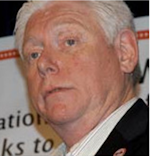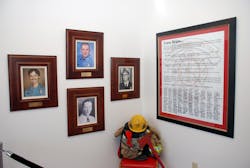Purpose in a Senseless Tragedy: The Amarillo Fire Department
Four years have elapsed since the Amarillo, TX, Fire Department lost our brother, Brian Hunton, after a fatal fall from a moving fire apparatus while responding to an emergency. The attached documents summarize our journey since Brian's death. Out of respect for Brian and for all the others that have lost their lives serving, we ask that all firefighters take a few moments to read and reflect on what we, the members of the Amarillo Fire Department, learned from Brian.
What We Learned from Brian
Firefighters save lives. In that sense, Brian Hunton is no different than any member of the Amarillo Fire Department. What sets him apart is that he saved firefighters lives four years after he died.
It's not hard to find firefighters who ignore the perils around them, rushing through smoke-filled doorways shielded only by personal heroism. They're in movies. Real firefighters face real dangers. Safety, for us, isn't a tether to be cast-off; it's a lifeline to be grasped. Brian was a real firefighter - trained, disciplined, focused on the hazards around the next turn.
Waiting around that turn on April 23, 2005, was a routine structure fire. It's a call units in the city respond to every day - business as usual. What stands out, in hindsight, is the ordinariness of that day. This could have been any call on any shift answered by any unit. Brian Hunton could have been any firefighter. In the end, he is every firefighter who ever struggled with equipment, dressed on the fly, or looked ahead to the smoke, flames, and the danger.
What happened on April 23, 2005, is Brian's story. What happened after is ours.
April in the Texas Panhandle brings a plague of fire hazards. Warmer days take people outdoors where a spark from a power tool or errant cigarette can light up the sprawling, dry winterkill. Nights and mornings barely break freezing so fireplaces hang on for the last, frigid gasp of the season, which on this night resulted in a structure fire.
A fire station is a study in efficiency. Every firefighter knows the importance of time. Time burns. The difference between a rescue and a grisly recovery is measured in seconds and the crew of Ladder One, an American LaFrance Quint, knew how to shave precious ticks off the stopwatch. Their movements were fine-honed to instinct, a Pavlovian response, triggered by an alarm. That alarm sounded at 10 o'clock on a typical Saturday night. Three units from the Central Fire Station were on the street in less than a minute.
Brian, 27, with two years in the department, grabbed his gear and climbed into the apparatus. He took a place in the backseat of the cab, an enclosed area protected by a heavy side-door. He began equipping himself en route, pulling on his coat and struggling with the bulky air pack.
One block from the station, the ladder turned and Brian, still donning his pack, fell against the door. For firefighters, the sensation of shifting inside a moving truck as it snakes through traffic was as familiar as walking. It is weight against metal as gear-wrapped torsos crash against interior doors without giving the experience a second thought. This, after all, is a safe place - far safer than clinging to the rear of a speeding ladder truck. It's part of firefighting. It happens all the time.
Only this time the door opened. Brian's head struck the pavement causing massive trauma. Two days later, he was gone from us.
News of a fallen comrade runs through a fire department like electric current. We all feel it. The strength of our department--of every department--is that we prepare for any scenario. We had the right training. We had the right procedures. And yet one of our own was dead and the piece of safety equipment that could have saved his life lay only a few inches away.
Brian had not buckled his seatbelt.
The AFD was, by any measure, a safe department. We had the paperwork to prove it. Reporting rookies received a binder full of SOGs and SOPs covering everything from flag raising to water use. We had a safety chief heading a safety committee that met to discuss any potential safety issues.
We had a comprehensive seatbelt policy and buzzers that let us know when they weren't fastened. We had everything we needed to save Brian except the capacity to see our own vulnerability. We looked ahead, planned ahead, rushed ahead. We valued speed. We kept our eyes on the task down the road and, somehow, lost sight of the one in front of us.
This wasn't the lapse of an individual firefighter; this was the lapse of a culture.
That had to change. We had to change.
What we needed couldn't come in a memo or mandate. Our problem was not a lack of rules; it was an issue of "group-think." In a profession where every call carries huge risks, we had learned to ignore the small ones. We created the problem together-solving it would take a team effort.
In 2006, we formed one. We called it Team Brian.
The group's members came from every rank in the department and each had an equal voice in the discussion. In examining the underlying causes of the accident, the team considered a key question-why do firefighters behave the way they behave?
The answer was they reflect the firefighters who came before them. We needed to change the paradigm. Crews were brought in one at a time and asked to identify the department's core values. Using their responses, the team initiated classes on mentoring, decision-making and the role of leadership-followership.
More importantly, each firefighter took responsibility for their own safety and the safety of those around them-and every member was empowered to make decisions within the command structure. The changes were immediate and measurable. Crews at incident scenes reported seeing greater risk vs. benefit analysis. Drivers said they were more aware of their speed at intersections and on Code 3 calls. In one instance, a firefighter was ordered off a truck because of a malfunctioning seatbelt-an unheard of action just a few months earlier.
Things were changing. We were changing. The only remaining question was whether we had succeeded in forming a new culture, or if old habits would return.
On an icy, snow-blown day in 2008, we got our answer. Several units were responding to a weather-related, 30-vehicle accident with multiple injuries. One of the units, Engine 6, topped a hill in a near-zero visibility or "whiteout" and encountered a stopped car. Forced to swerve, the engine slid off the interstate and rolled over. The cab was crushed. One by one, the four members of the unit wiggled free from the vehicle and went to work assessing the condition of the injured they'd been called to treat.
Every crewmember had been wearing a seatbelt and were uninjured. Before Brian Hunton, that outcome would have been far less likely.
Since April 24, 2005, not a single AFD fire truck has moved one inch until every crewmember is in a seatbelt. It's our commitment. It's our culture.
It's a promise we made too late to one of our own.
Team Brian isn't about seatbelts. It's about recognizing dangers large and small-the ones that lie ahead and the ones close enough to touch us without warning. Safety is a moving target. To follow it, you may need to change your point of view.
Our story isn't about the Amarillo Fire Department; it's about every fire department. We urge departments across the country to empower your members; listen to their insights and start your own team. We call ours Team Brian. We hope yours never has a name.
For more information on Team Brian contact:
Deputy Chief Monty Owens
Emergency Response Coordinator
Amarillo Fire Department
310 S. Van Buren
Amarillo, Texas 79101
(806)378-3548
[email protected]
From Dr. Burton A. Clark, EFO, CFO
I want to thank the Amarillo fire department for having the courage to share what they learned from Brian. Brian Hunton was a 2004 National Fire Academy graduate. He will live on every time the Team Brian story is told. Every firefighter can honor Brian by taking the National Fire Service Seat Belt Pledge and buckling up every time. The American Fire Service will know we have changed our safety culture because there will be no seat belt LODDs. Brian Hunton can save your life!

Burton Clark
Dr. Burton A. Clark, EFO, has been in the fire service for 50 years, including the District of Columbia in Washington, DC, Prince George's County Fire Department in Maryland and the National Fire Academy. He served as assistant fire chief in Laurel, MD, as an operations section chief at DHS/FEMA during national emergencies and disasters and as a Visiting Scholar at Johns Hopkins University. Clark presently serves on the Board of Advisors for the Fire Service Psychology Association and the Board of Governors for the John M. Moschella Fire Service Research Grant Trust. He is a technical expert reviewer for the National Institute for Occupational Safety and Health's Fire Fighter Fatality Investigation and Prevention program and a doctoral dissertation advisor at various universities. Clark is the author of "I can't Save You, But I'll Die Trying: The American Fire Culture." His webpage is americanfireculture.com. Clark was inducted into the National Fire Heritage Center's Hall of Legends, Legacies and Leaders. Clark can be reached at [email protected].






